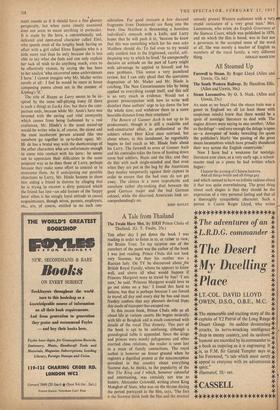A Tale from Thailand
THE other day I put down the book I was reading in order to listen in to, or rather to view, the Brains Trust. To my surprise one of the members of the panel was the author of the book I was just reading. Prince Chula did not look very Siamese, but then his mother was a Russian lady. On TV he discoursed about ,the British Royal Family, whom he appears to know well, and above all What would happen if Princess Margaret were to travel by bus! 'I am sure,' he said, 'Princess Margaret would love to go out alone on a bus.' I found this hard to believe, but that is perhaps because I am forced to travel all day and every day by bus and must frankly confess that any pleasure derived from this mode of transport has escaped me.
In this recent book, Prince Chula tells us all about life at various courts. He begins naturally with life at Bangkok and is much concerned with details of the royal Thai dynasty. This part of the book is apt to be confusing, although a genealogical table is appended. Since the kings and princes were mostly polygamous and often married close relations, the reader is soon lost in a maze of family connections. The royal author is however on firmer ground when he registers a dignified protest at the misconception prevalent in this country about everything Siamese due,• he thinks, to the popularity of the film The King and I which, however colourful and entertaining, was certainly not true to history. Alexander Griswold, writing about King Mongkut of Siam, who was on the throne during the period portrayed in the film, says, 'The fact is the Siamese think both the film and the musical comedy present Western audiences with a very 410 stupid caricature of a very great man.' Mrs. Leonowens, who wrote An English Governess at the Siamese Court, which was published in 1870, and on which the film is based, was in fact not a governess in the accepted sense of the word. at all. She was merely a teacher of English to members of the royal family, a very different


































 Previous page
Previous page